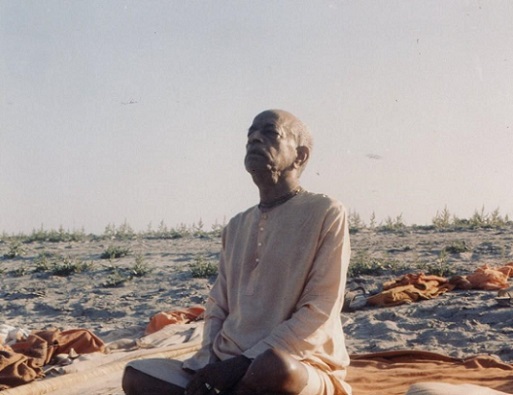(Click to enlarge photo of Srila Prabhupada)
"A person who is cent-percent engaged in the service of the Lord is the emblem of all knowledge. Such a devotee of the Lord in full perfection of devotional service is also perfect by the qualification of the Personality of Godhead. As such, the eightfold perfections of mystic power (aṣṭa-siddhi) constitute very little of his godly opulence."
(Śrīmad-Bhāgavatam 1.5.6, Purport)
"For a perfect yogī, there are eight kinds of superachievements: one can become lighter than air, one can become smaller than the atom, one can become bigger than a mountain, one can achieve whatever he desires, one can control like the Lord, and so on. But when one rises to the perfectional stage of receiving dictation from the Lord, that is greater than any stage of material achievements above mentioned."
(Śrīmad-Bhāgavatam 3.15.45, Purport)
"The mystic yogīs, who practice different types of austerities for attainment of eight kinds of material perfection and who ultimately meet the Supersoul (Paramātmā) in trance, are called siddhi-kāmī, or those who desire the perfection of becoming finer than the finest, becoming heavier than the heaviest, getting everything desired, having control over everyone, creating everything liked, etc. All these are abilities of a powerful yogī. But the devotees of the Lord do not want anything like that for self-satisfaction. They want only to serve the Lord because the Lord is great and as living entities they are eternally subordinate parts and parcels of the Lord. This perfect realization of the self by the devotee helps him to become desireless, to desire nothing for his personal self, and thus the devotees are called niṣkāmī, without any desire. A living entity, by his constitutional position, cannot be void of all desires (the bhukti-kāmī, mukti-kāmī and siddhi-kāmī all desire something for personal satisfaction), but the niṣkāmī devotees of the Lord desire everything for the satisfaction of the Lord. They are completely dependent on the orders of the Lord and are always ready to discharge their duty for the satisfaction of the Lord."
(Śrīmad-Bhāgavatam 2.4.19, Purport)
"Yogīs, they want power, material power. Aṇimā laghimā siddhi, aṣṭa-siddhi. So if you have some power, you can fly in the air, you can walk over the water, you can get anything you desire immediately. These are yoga-siddhis. So that is also satisfying own sense gratification. So except bhakti, everything is for sense gratification. That is unfavorable. Kṛṣṇa does not want to satisfy anyone's sense. That is not Kṛṣṇa's business. Kṛṣṇa is the Supreme. He wants everyone should serve Him. He's not going to serve anyone. That is Kṛṣṇa's position. Therefore anyone who serves Kṛṣṇa and preaches this philosophy, to serve Kṛṣṇa, that is favorable."
(Srila Prabhupada Lecture, Vrindavan, October 28, 1972)
"The yogīs, they want siddhi, aṣṭa-siddhi—aṇimā, laghimā. They can become more smaller than the smallest, bigger than the biggest. Prāpti, īśitā vaśitā prākāmya. There are eight kinds of siddhis the yogīs can attain. But a devotee does not want all these things. He has no demand. These are the three demands: bhukti-mukti-siddhi. But devotee has no demand. That is the special qualification. Devotee never demands anything."
(Srila Prabhupada Lecture, Bombay, January 1, 1973)
"Everyone in this material world trying to mitigate or trying to become free from the distress. Duḥkhasya. Ātyantika-duḥkha-nivṛtti. Ātyantika means supreme. The struggle for existence in this material world is everyone is trying to get some happiness and minimize the quantity of distress. This is called struggle for existence. Generally, yoga practice is executed for getting some material profit: aṇimā, laghimā, prāpti, īśitā, vaśitā, mahimā. Aṇimā... The yogīs, they have aṣṭa-siddhi-yoga, eight kinds of perfection. One can become smaller than the smallest or lighter than the lightest, bigger than the biggest; whatever he likes, he can get immediately; vaśita, he can control over; he can create a planet even. These are some of the yoga-siddhis. But here it is said that the supreme yoga system is not to aspire for material happiness, neither to become distressed by the material inconveniences. This is perfection of yoga."
(Srila Prabhupada Lecture, Bombay, November 13, 1974)
"In conclusion, a person who always concentrates on the transcendental form of Kṛṣṇa within his heart can very easily strike the whole world with wonder at his activities. This is the perfection of yoga performance, as confirmed in Bhagavad-gītā (BG 6.47). Yoginām api sarveṣām: of all yogīs, the bhakti-yogī, who thinks of Kṛṣṇa always within his heart and engages in His loving transcendental service, is the topmost. Ordinary yogīs can exhibit wonderful material activities, known as aṣṭa-siddhi, eight kinds of yogic perfection, but a pure devotee of the Lord can surpass these perfections by performing activities which can make the whole universe tremble."
(Śrīmad-Bhāgavatam 4.8.78, Purport)
.
.
